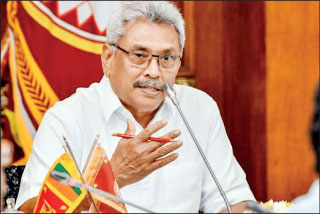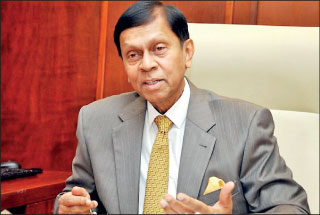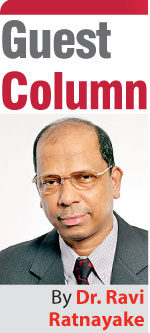Friday Feb 20, 2026
Friday Feb 20, 2026
Wednesday, 30 March 2022 02:20 - - {{hitsCtrl.values.hits}}
 |
| President Gotabaya Rajapaksa |
 |
| Central Bank Governor Ajith Nivard Cabraal
|
An economic analyst recently stated, “Then, there was a second error made by his policy advisors. The Central Bank Governor whom he appointed was an academic who had believed throughout his academic career that undertaking expenditure programs through money printing by the Government could deliver miracles to an economy” (Dr. W.A. Wijewardana, Daily FT). He was referring to President Gotabaya Rajapaksa’s advisors. I would like to add two more points to his remarks.
One, the aforementioned academic (with due respect to his academic credentials) is also a firm believer in inward-orientation, controls, and extreme import substitution, a kind of economic thinking that existed until the end of 1970s around the world. Countries rejected these policies as they failed to deliver expected economic results. Sri Lanka followed the same before the 1980s and people witnessed situations similar to what is going on now but less severe in terms of impact on people compared with the current crisis (i.e. shortages of everything and unpreceded queues).
Given that the Central Bank governor is the top authority of monetary policy and the management of exchange rate and he/she is enormously influential in national policymaking, it is highly likely that the current Government has continuously followed the former governor’s outdated ideology during the first two years of its administration. This ideology and related actions are primarily responsible for the current crisis. While it is extremely difficult to point the finger at one person, the collective leadership and advisors should take full responsibility for their reckless and immature decisions and pushing people into immense suffering, hunger, and poverty. Experiences of other countries of similar development status show clearly that this catastrophe was not due to COVID-19, but was ‘manmade’.
 Poor management of reserves
Poor management of reserves
The shortage of foreign exchange reserves which is the centre point of the current crisis was created by wrong policy advice based on closed and controlled economy dogma in reserves management. First, all sources of foreign exchange earnings except one (tourism) were either discouraged or blocked by unwise decisions. Second, the Government lost over Rs. 5 billion due to its efforts to keep the dollar around Rs. 200 forcefully throughout 2021, which was again a strategic mistake.
On the issue of closing the channels of foreign exchange earnings, firstly, exports were discouraged by import restrictions on imported inputs. As a result, exporters were affected by the shortage of foreign exchange to buy such inputs from other countries. And also, they were penalised by the over-valued fixed exchange rate creating a huge incentive bias against exports. Secondly, foreign direct investment declined due to an unfriendly policy environment with controls, restrictions, and unpredictable economic policies. Thirdly, though the COVID-19 hurt remittances, the fixed exchange rate regime and related controls were equally responsible for the decline in inflows of remittance. As a result, a significant portion of such foreign exchange earnings, amounting to many millions of dollars never came to the country.
The same mistake by two governments
Surprisingly, both former and current governments committed the same mistake in appointing the wrong persons to the post of Central Bank governor. The appointment of the first governor of the Central Bank under the previous Government, soon after it came to power, led to the so-called ‘bond scandal’. That was the beginning of the decline of the ‘Yahapalanaya’ government. It is clear that both governments paid (paying) high prices for appointing the wrong persons for the post of the Central Bank governor. Fortunately, respective governments later realised the wrong choice and rectified it by appointing new governors though it is too late for the current administration as the damage has already happened.
Though Government is responsible and accountable for the ongoing calamity, indeed, the wrong policy guidance by advisors played a significant role in creating these critical situations. In this context, one can re-emphasise the importance of an independent Central Bank and appointing an experienced and pragmatic economist as its head, a system that prevailed in Sri Lanka many years ago.
Multiple jeopardies for the poor
On top of the enormous costs associated with the COVID-19 related economic crisis in terms of loss of lives, jobs, and increasing poverty, Sri Lankan people are hit by four major predicaments. (1) Dangerous shortages of food, fuel, electricity, and much-needed imported raw materials and inputs required for agriculture and manufacturing production. (2) Skyrocketing prices of all goods and services due to shortage of foreign exchange reserves, which has declined to a 3-digit level. (3) Much delayed devaluation of the rupee, further raised prices of all goods, which should have been carried out many months ago. In the first place, the exchange rate should not have been fixed, which led to several other damages to the economy, including a huge impact on the export sector.
(4) Imposition of import restrictions on several hundred goods, which has serious repercussions. One, permitting only some companies and individuals to import results in less competition in the market and high prices with huge costs to both consumers and producers who do not have such a privilege. Two, creating a group of privileged people who are allowed to siphon off huge margins from sales of these restricted items at the cost of consumers. Three, increased corruption resulting from the mismanagement of the issuance of licenses. All these factors have resulted in a massive level of inflation. Once again, one should not forget what has happened during the 1970s and how people paid for the wrong policy choices.
Dr. Harsha Silva, MP, recently mentioned, “How are you going to govern a country with all doors and windows are closed?” He is absolutely right. We are living in a globalised and integrated world. All economies are interdependent and interconnected, and no economy can survive alone. When all countries have opened their doors and windows to different extents based on their country situation, Sri Lanka cannot work in isolation behind closed doors. The countries which tried to follow this practice, including Sri Lanka in the 1970s, failed. Unfortunately, the policy advisors and policymakers could not understand this simple fact.
Liberal and transparent trade policy
While there is so much wisdom and advice coming from several economic analysts regarding the macroeconomic aspects of the crisis, including debt restructuring and budget deficit, I wish to offer some policy options in the area of trade policy, which should be an integral part of the domestic policy reform package required to deal with the current multiple crises. A well-crafted trade policy taking into account local and international trading environment could contribute substantially to the revival of the economy.
Modern trade policy is much broader, deeper, and more complex than what was some 40 years ago when unilateral liberalisation dominated trade policy. Such a policy should take into account all aspects of the trade such as the World Trade agreements, free trade agreements, global value chain, trade facilitation, and FDI as well as national development priorities, resources, and supply-side capacity. A proper trade policy would ensure predictability, consistency, and transparency in both policies and regulatory structure. It would also enhance efficiency, competitiveness, institutional coherence, social equality, and inclusiveness.
Import liberalisation
Import policy is an important component of trade policy. As the current import policy is complex and distorted because of the interventions based on the need for revenue generation and non-economic reasons, the import policy should be reformed urgently enabling the business sector to do its duty, namely, trade and investment. The tariff regime remains non-transparent, complex, and unpredictable, which needs to be rectified, taking into account national development objectives and priorities. In the reform process, attention should be paid to the expansion of the activity of the global value chain, which is at an early stage in Sri Lanka compared with many other developing countries.
The objectives of an import liberalisation strategy are to (a) create employment opportunities, (b) generate reciprocal market access to exporters (c) enhance both resources and cost efficiency of domestic industries through fair competition (d) enhance the ability of local firms, in particular, SMEs to enter into global production sharing networks, (e) reduce anti-export bias, (f) attract more FDI and increase technology transfer, and (g) finally increase benefits to consumers.
Export-led trade policy
Apart from the rationalisation of the current tariff structure, a national export strategy with a particular focus on some selected new export sectors, including export-oriented import substitution industries, is urgently needed. For this purpose, the existing export strategy with required modifications taking into account the new international and national trading environment should be implemented immediately. In achieving increased export performance, the government should focus on trade facilitation, supply-side capacity development, complementary macroeconomic policies, in particular, realistic exchange rate, and trade logistics.
The country urgently needs an Integrated Economic and Social Policy Framework
A well-known international economist (Professor J. Bhagwati) once used the term ‘Spaghetti bawl’ to describe a complex situation in trade agreements. In the spaghetti bawl, it is extremely difficult to find the beginning and the end of spaghetti. Now, Sri Lanka is facing a similar situation where one cannot find the beginning and end of the crisis and policy prescriptions. Though with much delay, the decisions on the devaluation of the currency and the IMF support are crucial actions in the right direction. This is a beginning of a long policy reform process, the results from which can only be realised with a considerable time gap.
The current ‘man-made’ crisis can only be managed with a carefully drafted Integrated Economic and Social Policy Framework consisting of (1) Fiscal policy consolidation: reduce capital expenditure at least 12 months (suspend building roads, grounds, ports, towers, etc.) and undertake tax reforms and use savings for essential services. Resources need to be allocated to deal with hunger and poverty, basic services such as health and education, and provision of essential utilities such as electricity. Special attention will have to be paid to the vulnerable and disadvantaged segments of society. (2) Increase interest rate to control inflation and encourage more savings, (3) Continue with the flexible exchange rate, which is likely to settle at a lower level depending on the recovery of the economy, (4) Reduce/remove import restrictions and rationalise the tariff structure, (5) Introduce strategies for export promotion and development of agricultural business, (6) Introduce a mechanism for encouraging remittances, (7) Promote foreign direct investment, (8) Forge international and bilateral partnerships with international agencies (i.e. IMF and World Bank) and countries, in particular, to deal with external debt, (9) Introduce a system to reduce the cost of living and financial support for the vulnerable segments of the population, and (10) Most importantly and urgently launch a campaign including through Sri Lankan embassies to build confidence internationally as well as locally highlighting the above-mentioned policy reforms. It is critically important to ensure proper implementation of the policy reform package as per a preset timeline without any disruptions such as policy reversals based on shortsighted, nationalist, and irrational advice.
(The writer is a former United Nations Director of Trade and Investment and the Chief Economist for the Asia-Pacific Region. He can be contacted at [email protected].)